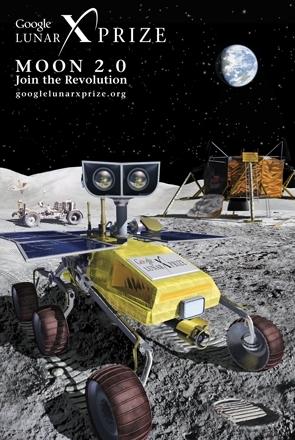The company "Google", in cooperation with the X-Prize Foundation, announced a new X-Prize, in the amount of 30 million dollars, which will be awarded to a private group that will succeed in landing a robotic vehicle on the moon that will transmit photographs from the surface
By Tal Inbar, Head of the Center for Space Research, Fisher Institute for Strategic Air and Space Research

The company "Google", in cooperation with the X-Prize Foundation, announced a new X-Prize, in the amount of 30 million dollars, which will be awarded to a private group that will succeed in landing a robotic vehicle on the moon that will transmit photographs from the surface. The venture, known as the Lunar X-Prize, is limited in time - the target date is December 31, 2012. If no one wins the prize by that date, it will be reduced and gone.
Similar to the Ansari X Prize, which was won by the team led by aircraft designer Brett Rutten and Microsoft founder Paul Allen, for the space flights of Spaceship One, the first private manned spacecraft, Google's Lunar X Prize competition is open to private entrepreneurs and non-governmental organizations from around the world.
If the mission is completed by December 31, 2014, the reward will be reduced to $15 million. The second place winner will receive five million dollars. In addition, an additional five million dollars will be awarded to whoever finds remnants of the Apollo landings or the Soviet Union's lunar missions, locates signs of frozen water on the moon, or manages to make the spacecraft continue to operate for the longest time.
Peter Diamandis, founder of the Percy X Foundation, estimated that four or five groups in the United States have the technical skill and resources needed to participate in the race to the moon, and about that number of groups outside the United States. He estimates the cost of building, flying and operating a probe on the surface of the moon at about 20 to 60 million dollars.
According to the rules of the competition, the private robot will have to travel 400 meters on the moon and provide several contents: a self-portrait, panoramic images and real-time video images of the moon.
The award system initiated by the X Awards Foundation is intended to encourage entrepreneurs around the world to engage in various space ventures, as well as to stimulate public opinion towards space exploration. It should be noted that the American space agency NASA uses a similar method (although its prize amounts are significantly lower) and periodically holds technological competitions in various fields, under the title Centennial Challenge. For example, in one of the competitions held recently, many teams tried to develop a glove for astronauts, which would be better and more comfortable than the one used by NASA today.

9 תגובות
Try not to land the spacecraft in the Sea of Tranquility because there is the most important step in history there
Not that the wheels of this research spaceship would crush the step why Neal would think it would end up in court - I'm sure
Listen, it's not such a story to launch something into space
Consider the steps needed for this and not how much it cost the government to launch robots into space.
If you want to do this, all you need is knowledge and money - and less than a million shekels.
When you build everything yourself, the cost is much less than the cost to the government because they employ many workers who each build a different part.
So if you build everything yourself - including the rocket engine, the robot, and the fuel, then you actually only need money to buy the raw materials, which are metal, electronic components, and fuel.
As I said, all these materials together cost less than a million shekels.
I myself intend to do this soon, I will buy and teach myself mathematics, physics and electronics.
It's all a matter of desire, believe me 🙂
If they want to promote free competition so much, then why are they giving out prizes?
The whole point is that it is a concept according to which free competition, involving private entrepreneurs, can advance the space ventures dramatically, compared to a model of government activity only. It is much less far-fetched than it seems at first glance (looking at the resources of the government versus a private entrepreneur).
How can residents launch a robot!?!? NASA took years to invent the robot they are sending and they also have resources and a lot of money